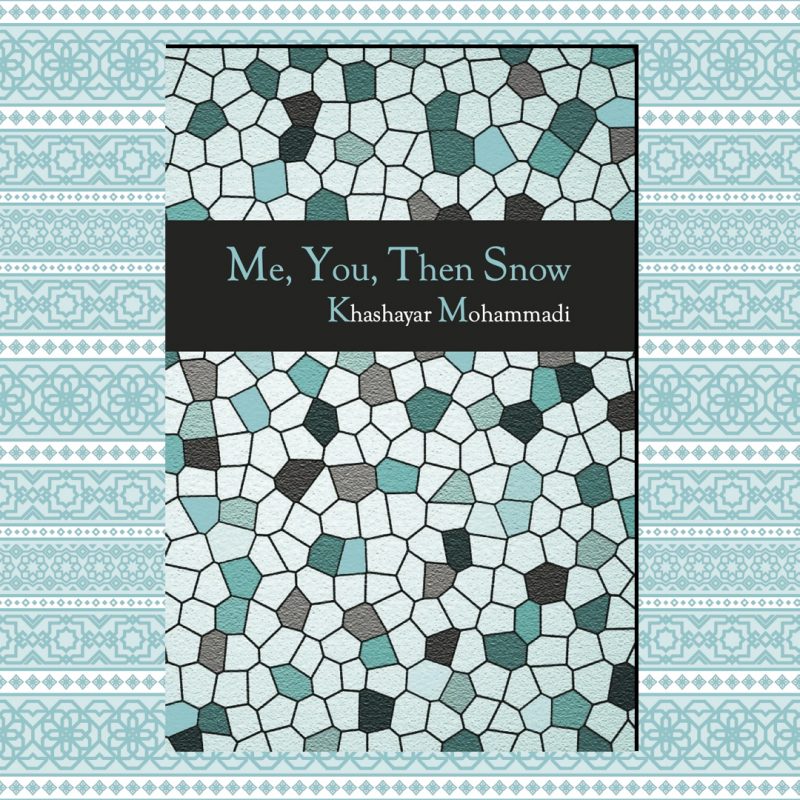USEREVIEW 029: Me, You, Then Me Again
Boldly eschewing the literary convention of never reviewing one’s own work, Khashayar Mohammadi reflects on his newly-released, debut poetry collection, Me, You, Then Snow (Gordon Hill Press, 2021), and its place in Canadian literature, in this autoethnographic experimental review.
ISBN 978-1-774220146| 96 pp | $20.00 CAD
#CAROUSELreviews
#USEREVIEWEDNESDAY
In the depths of pandemic insomnia, there isn’t much I can read anymore; so I keep reading and rereading my debut, anticipating the pictures, reviews, award season; practising my poker face when someone confidently tells me they didn’t enjoy my book, practising my humble face when someone tells me ever-so-enthusiastically how great it was.
I read my book over and over and inhabit the three-year thought-span of a pile of poems, seemingly random, carved into a book by my editor Shane Neilson. I reminisce about how they used to look, often read out loud words that were cut three edits ago. I can never unsee the lattice, or the crumbs that were brushed away to make the words more visible. Meanwhile I’m still hanging onto the three times I used the word “Zen-plough.” They no longer exist in the book (I almost named the entire book Zen-ploughed Furrows, I laugh at it now); there are so many what-ifs on each page.
What I think about most often is how the book is bought and sold in the market of representation. How do I present as a queer? How do I present as a West Asian? How do I present as an Iranian, a neurodivergent etc. etc. etc. I wonder how I’ll be celebritized and commoditized in the business of identification. How will I assimilate or diverge from the narrative or from tradition?
I love how much we’ve been championing our poets of all minorities and various marginalized communities, but it’s disturbing to treat poets as isolates. It’s disturbing to advertise poets to the false binary of ‘white audience’ and ‘minority audience’; there are infinite audiences fitting in between. As a poet of colour, it seems you can only do one of two things: 1. explain your culture as a monolithic structure to an audience as if no one has ever heard of it before; or, 2. treat your culture as a diverse, intricate given and write for an audience that will find its path through your book. Is your poetry ‘open’ for people to take away from, or deposit into? But identity isn’t binary, and neither is readership. It’s important not to treat cultures as monoliths that can be fed to us by singled-out individuals who get left with the effort of explaining it to us. Like any relationship, there must be a healthy give and take on either side. Have I explained my book too much? Or not enough? Is my book self-contained or does it require homework?
I read through my book, and I start to believe the hype about myself. Yes! I am a this just like that critic says! I am a that just like my friends say! Just like readers think! And I’m gonna stay on this path to feed this culture of celebrity, becoming either an ‘educator’ on the topic of my experience, or perhaps I can self-fetishize for whichever audience pays most for it. I’m gonna be ‘groundbreaking’ and disconnect myself from centuries of Persian poetry whose esoterica is ingrained in me. I’m gonna be ‘innovative’ and disconnect myself from countless contemporary poets who broke tradition, countless poets whose tradition-breaking I took on as new tradition. I’ve grown too large for the holes in my own narrative, so I’ll become malleable instead to let my readership fill the voids in my philosophy for me. To me there’s nothing more jarring than being a ‘fresh’ voice. As jarring as going to a vineyard and being served ‘fresh wine.’ Poets aren’t isolates.
With the rise of celebrity writer culture, we’re slowly waving goodbye to a culture of constructive criticism. It’s hard to find places that willingly publish reviews that are deeply critical, and it’s directly related to the individualist western approach to poetry. If we treat poets as ‘fresh’ and individual voices, criticizing their poem / book will also have the implication of criticizing them as individuals and therefore their identities and experience; but if we approach poetry as a collectivist discipline wherein each poet is a single iteration, then criticism will not implicate an attack on the poet as an individual, but instead it will be reframed as a criticism of how they fit into the tradition that they claim to perpetuate.
The problem here becomes that the harsher, well-established elite of academia use the exact same above-mentioned ‘excuse’ of coherence / divergence from tradition to dismiss writers of minorities and marginalized communities, and further justify their ignorance by parroting everything mentioned above. I want it to be made clear that it’s a path that needs to be tread carefully. The upper echelons of Canlit have the privilege of breaking tradition to their liking, and sticking to tradition when it serves them, while writers of minority communities are always viewed through a lens of tradition no matter what. A contemporary Chinese writer can write about Instagram and get reviewed based on 2500-year-old Confucian doctrine while a cis, heterosexual white Christian writer can be celebrated for being an emphatically ‘contemporary’ voice. A minority writer needs to remain constantly coherent within their narrative while the status quo can glide in and out of tradition according to their own liking. Thinking back to my book, I wonder, will I be celebrated for writing about psychosis through the lens of Rumi? Will I be judged for reframing my own culture to fit another? Will I be criticized by fellow Iranians for crossing cultural boundaries to represent my experience cross-culturally?
Another issue that is never taken into consideration is how speaking other languages affects writing in the English language. ‘Innovative’ literature of white Christian writing often stems from a certain boredom with monolingualism, experiments with language and form born of frustration with the inability to think in other languages. These experiments, however valuable (yet a privilege), put a certain pressure on those who write in their secondary or tertiary languages, writers whose daily lives contain such linguistic play that is perhaps inaccessible to a community that doesn’t speak their specific mixture of languages; they must put great effort into perfecting structure, form and grammar, while their white Christian counterparts are celebrated for breaking away from the ‘tradition’ of English semantics and grammar and experimenting. But it’s important to realize that, for multilingual writers, linguistic experimentation is not a hobby or privilege, but a tool for survival that they may not want to use for artistic purposes. When the reader reads an entire section of my book that incorporates words alien to them, how will they react? Is it a skill to glide in an out of languages? Is this linguistic play accessible? Should it be accessible? And, if so, to whom?
I read my own poems, not to see how eloquent, or how coherent of a narrative I’m pursuing, but to see how well I fit into my own narrative. The most praise often goes not to the most ingenious discourse, but to the discourse that identifies best with itself. It doesn’t matter how well I tell my story, as long as I fit the image I’m presenting I’ll avoid enough paradoxes to attract general praise.
And here we get to the question of inquiry within poetry. Is poetry inherently, or necessarily, a form of inquiry? Are writers required to identify with themselves? If not, what scope justifies the speculation? Is the reader entitled to discovery? Or is discovery a labour divorced from representation? Is discovery a privilege? Who is a reliable narrator? And how many maybes does it take to arrive at certainty? Can we unburden ourselves by treating writers as an “e.g.” as opposed to an “i.e.”?
I don’t know. I like my poems. I get lost in my poems. I made a Goodreads page for my book and I’m gonna join the Goodreads authors who five-star their own books. I’m no academic or scholar, but when I read my own poems I realize that I write my own favourite poems. I think the most important aim in my poetry is to become my own favourite poet. I identify a lack in my surrounding literature, and I decide to fill it with my own words.
I read my book, Me, You, Then Snow and in it I find what I couldn’t find as a young(er!) poet, and, regardless of how it fits into the general corpus of Canadian literature, I’m happy that it exists for another young poet to read and build upon.


